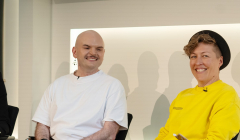
‘There is a climate of fear for marketers’
Industry leaders urged brands to transition from caution to courage at Courageous Leaders Live

Transforming the lives of disabled people demands a transformation in attitudes, not an over-reliance on outdated ‘inspiration porn’

When it was announced that Rose Ayling-Ellis was going to be competing on Strictly Come Dancing, I was nervous about how the public would react. Although we live in a world where people who happen to stand out from the crowd are often subjected to abuse on social media, this was not the reaction I was most afraid of. Instead, it is the tweets, posts and articles which would instantly label Rose Ayling-Ellis as ‘inspirational’ which I feared would do the most damage to her and to the disabled community.
Too often disabled stories are told to make those living without disabilities feel better about themselves. This is known as “inspiration porn”. This narrative is extremely harmful to the disabled community as it reduces them to nothing more than their conditions.
Thankfully, public attitudes are beginning to change, and awareness of inspiration porn is on the rise. Wunderman Thompson recently analysed over 14,000 online posts about disabled people and found a 112% increase in the use of the term ‘inspiration porn’ in the lead up to the Paralympic Games. Creative campaigns are following suit too: Channel 4’s 2021 campaign for the Paralympics had the tagline “To be a Paralympian, there’s got to be something wrong with you”, which is a far cry away from “Meet the Superhumans” in 2012.
Too often disabled stories are told to make those living without disabilities feel better about themselves. This is known as “inspiration porn”. This narrative is extremely harmful to the disabled community as it reduces them to nothing more than their conditions
Patrick Kane, Disability Campaigner
During this year’s Paralympic Games, the International Paralympic Committee and the International Disability Alliance (along with global partners from a range of industries) launched the ‘WeThe15’ campaign (pictured), with the aim of transforming the lives of disabled people. One key objective is to break down barriers that prevent people with disabilities from fulfilling their potential, including educating others not to lazily describe disabled people as “inspirational” or “special” because of their conditions.
Education is imperative for this type of change, and some social media channels are doing a better job than others in allowing disabled content creators to flourish. Building media platforms so that everyone is able to use them is vital as it ensures disabled people can represent themselves and not have others assign labels for them. This need is underlined by the fact that despite representing 15% of the world’s population, disabled people feature in just 0.06% of advertising.
TikTok is showing signs of being the platform to truly put accessibility first. Other platforms, like Instagram, which require a follower base to be carefully cultivated tend to result in aspirational “suggested” pages that don’t stray far from society’s norm. By contrast, TikTok’s algorithm democratises its platform to content creators, especially on its “For You” Page. Disabled creators have been able to have meteoric rises and own their narratives in the process. One example is the BBC Radio 1 producer Lucy Edwards, who has 1.7 million followers on TikTok compared with just 108,000 on Instagram.
As a disabled creator myself, I am encouraged to see TikTok pioneering in this way and allowing disabled creators to flourish. With democratising algorithms and powerful global initiatives, there is real hope that the right information can be shared, and everyone will have the chance to listen. Perhaps then we can all be inspired by Rose Ayling-Ellis’s personality, talent and dance moves rather than just her medical history.
Technology is playing an important role in redefining disability, but attitudes are going to have to adapt, too. There are more than 13 million disabled people in the UK, yet a recent survey by Scope reports that 67% of the British public feel uncomfortable talking to disabled people: 21% of 18- to 34-year-olds admit they have avoided talking to disabled people because they were unsure how to communicate with them.
Patrick became a triple amputee after contracting sepsis when he was nine months old and he currently works as a Catalyst Fellow at global marketing communications agency Wunderman Thompson. Patrick is an ambassador for Össur and the UK Sepsis Trust. His career focuses on the need for effective communications relating to disability, technology, and their wider societal importance. Patrick frequently speaks and writes on these topics too. Previous platforms include TEDxTeen, WIRED: Next Generation and he is in the process of writing his first book, which is due to be published in March 2023.
Looks like you need to create a Creativebrief account to perform this action.
Create account Sign inLooks like you need to create a Creativebrief account to perform this action.
Create account Sign in